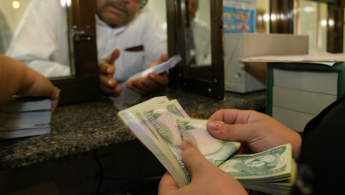Iraq parliament approves 2021 budget as Baghdad faces economic crisis
The government forecasts revenues of $69.9 billion based on oil exports of 3.25 million barrels per day.
The budget set a barrel of oil at $45, well below the market price of $60.
Iraq last approved a budget in 2019, but the following year it failed to adopt a budget as it faced nationwide protests and a change of government.
War-scarred Iraq is the second biggest crude producer in the OPEC oil cartel, but it has been wrestling with mounting financial and economic woes.
The Iraqi dinar has lost around 25 percent of its value within weeks, in a country where job losses and poverty are on the rise.
According to the World Bank, the level of poverty doubled in 2020 and 40 percent of the country's 40 million people are now considered "poor".
Read also: Iraq's Jewish community dwindles to fewer than five
The Iraqi economy, one of the world's most oil-dependent, according to the World Bank, saw its gross domestic product contract by about 10 percent this year.
The 2021 budget forecast that 80 percent of state revenues will rely on oil sales, including 250,000 bpd produced in the autonomous Kurdish region of northern Iraq.
The budget also estimated investments at $19.6 billion compared to $27.8 billion in 2019, when the deficit stood at $23.1 billion.
Iraq's Prime Minister Mustafa Al-Kadhemi's government has sought to fast-track foreign investment including Saudi support for energy and agriculture and is now pushing for deeper economic ties with the kingdom.
On Wednesday, Saudi Arabia's crown prince hosted Khademi in Riyadh, as the premier arrived on a long-awaited visit that officials say aims to forge closer trade ties.
The trip comes after Iraq and Saudi Arabia reopened their land border, the Arar crossing, in November for the first time in 30 years, in a new effort to revive once-frosty ties.
Kadhemi's visit seeks to "further enhance economic cooperation and investment" as well as "explore ways to strengthen regional stability", the official added.
"Today, we embark on a visit to the kingdom of Saudi Arabia to strengthen our bilateral ties and enhance regional cooperation," Kadhemi wrote on Twitter before his arrival.
"We will work on serving our peoples' interests, achieving stability and advancing developmental values based on what binds us."
Known to maintain close personal ties with the Saudi crown prince, Kadhemi walks a diplomatic tightrope as Baghdad often finds itself caught in the tug of war between Tehran and Riyadh as well as its ally Washington.
Iraq is the second-largest producer in the OPEC oil cartel, outranked only by Saudi Arabia.
Agencies contributed to this report.
Follow us on Facebook, Twitter and Instagram to stay connected





 Follow the Middle East's top stories in English at The New Arab on Google News
Follow the Middle East's top stories in English at The New Arab on Google News
![Israeli forces ordered bombed Gaza's Jabalia, ordering residents to leave [Getty]](/sites/default/files/styles/image_330x185/public/2176418030.jpeg?h=a5f2f23a&itok=_YGZaP1z)

